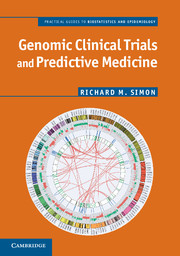Book contents
- Frontmatter
- Contents
- Acknowledgments
- Introduction
- 1 Clinical Trial Basics
- 2 Actionable Prognostic Biomarkers
- 3 Phase II Designs
- 4 Enrichment Designs
- 5 Including Both Test-Positive and Test-Negative Patients
- 6 Adaptive Threshold Design
- 7 Multiple Predictive Biomarkers
- 8 Prospective–Retrospective Design
- Appendix A Statistics Background
- Appendix B Prognostic Classifiers Based on High-Dimensional Data
- References
- Index
4 - Enrichment Designs
Published online by Cambridge University Press: 05 February 2013
- Frontmatter
- Contents
- Acknowledgments
- Introduction
- 1 Clinical Trial Basics
- 2 Actionable Prognostic Biomarkers
- 3 Phase II Designs
- 4 Enrichment Designs
- 5 Including Both Test-Positive and Test-Negative Patients
- 6 Adaptive Threshold Design
- 7 Multiple Predictive Biomarkers
- 8 Prospective–Retrospective Design
- Appendix A Statistics Background
- Appendix B Prognostic Classifiers Based on High-Dimensional Data
- References
- Index
Summary
Predictive classifiers provide information about whether a particular patient is likely (or unlikely) to benefit from a particular treatment. One classic example is the level of expression of the estrogen receptor protein in breast cancer cells as a predictor of response to antiestrogen treatments such as tamoxifen. A more recent example is the level of expression of the Her2 protein or the degree of amplification of the Her2 gene in breast cancer cells as a predictor of response to the anti-Her2 antibody trastuzumab. After anti-EGFR antibodies cetuximab and panitumumab were approved for the treatment of advanced colorectal cancer, it was demonstrated that the drugs were not effective for patients whose tumors contained KRAS mutations. Hence KRAS mutation status is a (negative) predictive marker for the use of these antibodies in colorectal cancer. Whether a biomarker or classifier is predictive depends on the context of use, the treatment, the alternative available treatment and the class of patients. Predictive classifiers have generally been based on single-protein or single-gene measurements related to the mechanism of action of the drug. Predictive classifiers and predictive scores can, however, be multigene or multiprotein summaries of the contributions of multiple measurements. For example, in addition to its established role as a prognostic factor for patients with node-negative breast cancer, the TAILORx clinical trial will test the role of Oncotype DX recurrence score as a predictive factor for benefit from chemotherapy in node-positive patients (Sparano & Paik, 2008, 620).
Many cancer drugs are being developed today with companion diagnostics to be used as predictive biomarkers. Sawyers (2008, 683) has stated that “one of the main barriers to further progress is identifying the biological indicators, or biomarkers, of cancer that predict who will benefit from a particular targeted therapy.” This increases the complexity of drug development and requires that an effective predictive biomarker be identified and a test for it be analytically validated prior to the launch of the phase III pivotal clinical trials of the drug. The discovery and phase II refinement of predictive biomarkers can be complex. It may require larger phase II databases, new approaches to phase II trial design as described in Chapter 3, or designs based on neo-adjuvant treatment (Pusztai, 2004, 641; Pusztai, Anderson, & Hess, 2007, 588; Hess et al., 2006, 637).
- Type
- Chapter
- Information
- Genomic Clinical Trials and Predictive Medicine , pp. 35 - 44Publisher: Cambridge University PressPrint publication year: 2013



